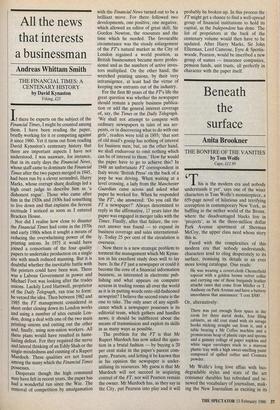All the news that interests a businessman
Andreas Whittam Smith
THE FINANCIAL TIMES: A CENTENARY HISTORY by David Kynaston Viking, £25 If there be experts on the subject of the Financial Times, I might be counted among them. I have been reading the paper, briefly working for it or competing against it since 1960. Yet it turns out from reading David Kynaston's centenary history that there are important aspects I have not understood. I was unaware, for instance, that in its early days the Financial News, whose gaff came to dominate the Financial Times after the two papers merged in 1945, had been run by a clever scoundrel, Harry Marks, whose corrupt share, dealings led a high court judge to describe him as 'a dishonest rogue'. Those who came after him in the 1920s and 1930s had something to live down and that explains the fervent rectitude I noticed as soon as I entered Bracken House.
Nor did I realise how close to disaster the Financial Times had come in the 1970s and early 1980s when it sought a means of reducing the overwhelming power of the printing unions. In 1975 it would have joined a consortium of the four quality papers to undertake production on a single site with much reduced manning. But it is doubtful whether the inevitable battle with the printers could have been won. There was a Labour Government in power and Michael Foot was looking after the trades unions. Luckily Lord Hartwell, proprietor of the Daily Telegraph, ran true to form: he vetoed the idea. Then between 1982 and 1985 the FT management considered in short order closing down its London works and using a number of sites outside Lon- don; doing a deal with one of the two main printing unions and cutting out the other and, finally, using non-union workers. All these plans would have resulted in humi- hating defeat. For they required the nerve and lateral thinking of an Eddy Shah or the single-mindedness and cunning of a Rupert Murdoch. These qualities are not found among the many which the Financial Times possesses.
Desperate though the high command may have felt in recent years, the paper has had a wonderful run since the War. The removal of competition by amalgamation with the Financial News turned out to be a brilliant move. For there followed two developments, one positive, one negative, which allowed an editor of great skill, Sir Gordon Newton, the resources and the time which he needed. The favourable circumstance was the steady enlargement of the FT's natural market as the City of London regained a world position, as British businessmen became more profes- sional and as the numbers of active inves- tors multiplied. On the other hand, the wretched printing unions, by their very intransigence, at least had the virtue of keeping new entrants out of the industry.
For the first 80 years of the FT's life the great question was whether the newspaper should remain a purely business publica- tion or add the general interest coverage of, say, the Times or the Daily Telegraph. `We shall not attempt to compete with ordinary newspapers in tales of sea ser- pents, or in discovering what to do with our girls', readers were told in 1893; 'that sort of old maid's gossip has nothing of interest for business men; but, on the other hand, we shall endeavour to omit nothing which can be of interest to them.' How far would the paper have to go to achieve this? In 1948 an unfortunate FT correspondent in Italy wrote 'British Press' on the back of a jeep he was driving. When waiting at a level crossing, a lady from the Manchester Guardian came across and asked what paper he worked for. When he responded `the Fr, she answered: Do you call the FT a newspaper?' Always determined to reply in the affirmative, 17 years later the paper was engaged in merger talks with the Times. Finally, after that failure, the cor- rect answer was found — to expand its business coverage and sales international- ly. Today 25 per cent of the circulation is overseas.
Now there is a new strategic problem to torment the management which Mr Kynas- ton in his excellent study does well to lay bare. Is the FT just a newspaper or could it become the core of a financial information business, as interested in electronic pub- lishing and what appears on computer screens in trading rooms all over the world as it is in putting words onto old-fashioned newsprint? I believe the second route is the one to take. The only asset of any signifi- cance which a newspaper possesses is its editorial team, which gathers and handles news; it should be indifferent about the means of transmission and exploit its skills in as many ways as possible.
The problem for the FT is that Mr Rupert Murdoch has now asked the ques- tion in a brutal fashion — by buying a 20 per cent stake in the paper's parent com- pany, Pearson, and letting it be known that in his opinion the newspaper is under- utilising its resources. My guess is that Mr Murdoch will not succeed in acquiring control of the FT, nor will Pearson remain the owner. Mr Murdoch has, as they say in the City, put Pearson into play and it will probably be broken up. In this process the FT might get a chance to find a well-spread group of financial institutions to hold its capital, as the Independent has done. The list of proprietors at the back of the centenary volume would then have to be updated. After Harry Marks, Sir John Ellerman, Lord Camrose, Eyre & Spottis- woode, Pearson, would be inscribed a new group of names — insurance companies, pension funds, unit trusts, all perfectly in character with the paper itself.


























































 Previous page
Previous page